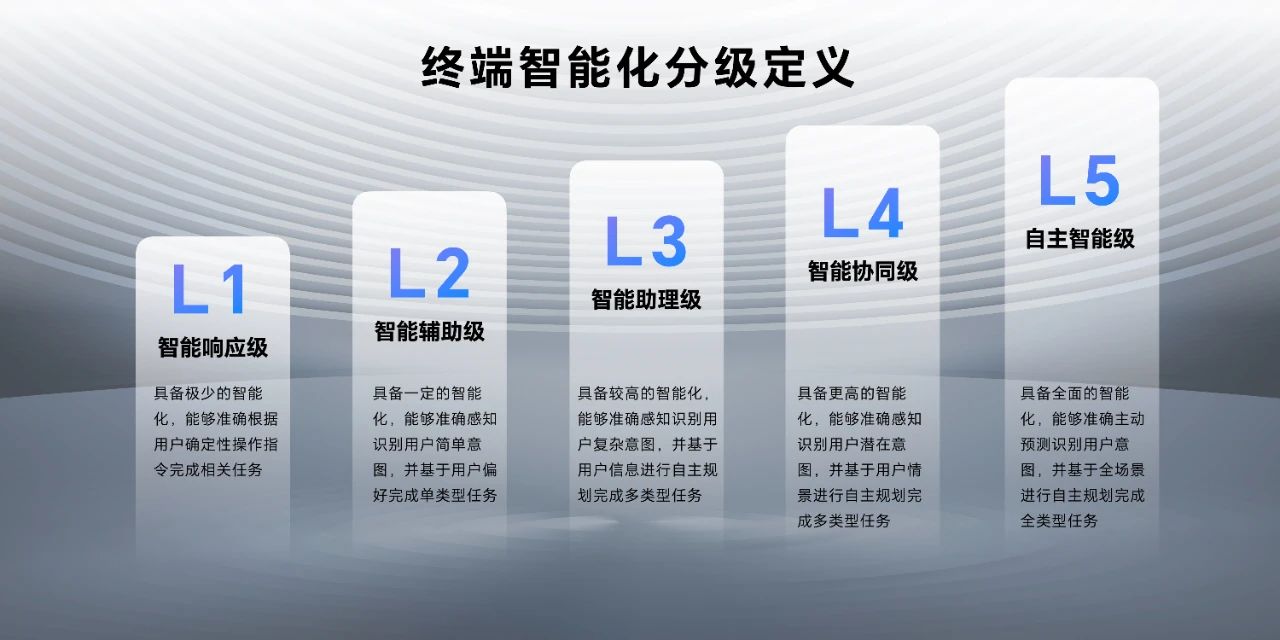The evolution of the new generation of information technology, represented by artificial intelligence, is accelerating, driving the intelligent terminal industry into a new era of ubiquitous intelligent connectivity and collaborative intelligence. Driven by technology upgrading and market demand, terminal intelligence has developed rapidly, but there are still some deficiencies in the research of terminal intelligence. Terminal intelligence refers to the deep empowerment of various terminal equipment based on advanced information technology, so that it has intelligent functions such as data processing capabilities, intention analysis capabilities, decision-making execution capabilities and learning and evolution capabilities, so as to provide more convenient, efficient and safe services for human beings. With the in-depth empowerment of terminals by technologies such as large models, the essential changes in terminal service methods and the in-depth innovation of terminal intelligent experience have led to the urgent need to establish a universal and cutting-edge grading system for terminal intelligence.
The China Academy of Information and Communications Technology (hereinafter referred to as the "CAICT") pays great attention to the development trend of terminal intelligence, and jointly leads with Honor, VIVO, Huawei, and OPPO, and cooperates with Lenovo, Xiaomi, ZTE, China Mobile Terminal Company, Qualcomm, Samsung, UNISOC, Boding Shihua, ARM Technology, Aojie Technology, Chengdu Tederic and other more than 20 key enterprises in the industry, in July 2024, the Telecommunication Terminal Industry Forum Association established a research project on terminal intelligence classification. The "Terminal Intelligent Grading Research Report" officially entered the approval stage.
After several rounds of in-depth discussions by industry experts, based on the current technology and industrial development characteristics, a unified consensus was reached on the intelligent classification of terminals, which provided a core foundation for the subsequent evaluation of the intelligence degree of various terminal equipment and related applications. According to the four core elements of the terminal's understanding of the user's intention, the learning and memory of the user's information, the task planning and the task completion, the terminal intelligence level is divided into five levels: L1-L5, from low to high, which are intelligent response level, intelligent assistance level, intelligent assistant level, intelligent collaboration level, and autonomous intelligence level.

Level 1 (Intelligent Response Level), with minimal intelligence, can accurately complete relevant tasks according to the user's deterministic operation instructions.
Level 2 (intelligent assistance level), with a certain degree of intelligence, can accurately perceive and identify the user's simple intentions, and complete single-type tasks based on the user's preferences.
Level 3 (intelligent assistant level), with high intelligence, can accurately perceive and identify complex intentions of users, and independently plan and complete multiple types of tasks based on user information.
Level 4 (intelligent collaboration level) has higher intelligence, can accurately perceive and identify the potential intentions of users, and independently plan and complete multiple types of tasks based on user scenarios.
Level 5 (autonomous intelligence) has comprehensive intelligence, which can accurately and actively predict and identify user intentions, and independently plan and complete all types of tasks based on all scenarios.
The terminal industry has the characteristics of rapid technological change, involving many fields, complex and diverse needs, and the intelligent construction of the terminal is a complex system project, which requires all parties in the industry to cooperate and complement each other's advantages to jointly promote the improvement of the intelligent level of the terminal. It is hoped that all parties in the industry will work together to promote the research of terminal intelligence, promote the entire industry to a higher level, create more value and convenience for end users, make intelligent terminals better serve people's lives and work, and help the development and progress of society.
The CTTL Terminal Labs of CAICT will continue to carry out a series of work such as terminal intelligent classification research and standardization formulation, and sincerely invite all parties in the industry to participate!
Consultation Contact:
Huang Yunxia huangyunxia@caict.ac.cn
Fu Rongrong furongrong@caict.ac.cn